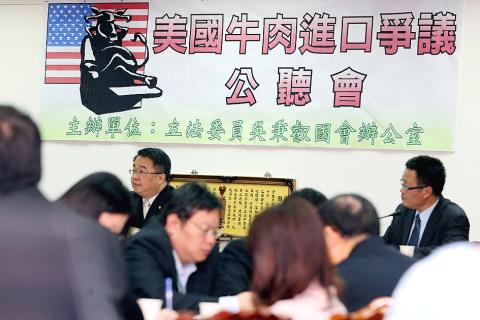Academics and representatives of local meat and civic groups yesterday expressed concern about the controversial animal feed additive ractopamine, saying the government should be cautious about opening up to imports of US meat products containing the drug.
The use of ractopamine would bring “additional and unnecessary risk” to food safety and more assessments and tests — in particular on the drug’s effect on high-risk groups, such as pregnant women and people suffering from chronic diseases — need to be conducted, many of the representatives said in a public hearing at the legislature in Taipei.
The hearing, organized by Democratic Progressive Party (DPP) Legislator Wu Ping-jui (吳秉叡), was held in the midst of a nationwide discussion about the possibility of easing restrictions on imports of US meat products containing the additive.

Photo: CNA
“One thing’s sure: It’s not zero-risk when you talk about ractopamine,” said Chou Chin-cheng (周晉澄), dean of National Taiwan University’s School of Veterinary Medicine.
“Despite available data showing that the effect of ractopamine on the human body is relatively low, why do we need the additional risk when we can exclude the drug from our food?” he said.
Adding to people’s concerns was the government’s sub-par performance with regard to preventive measures imposed on US beef imports since 2009 — when Taiwan lifted bans that had been introduced amid concern over mad cow disease — and the government’s non-transparent approach in dealing with the current dispute, Chou said.
Lin Chiu-kuei (林秋桂), vice president of the Republic of China Swine Association, said the country’s pig farmers opposed the US imports and would protest vehemently if the association’s negotiations with the government broke down.
“Taiwan’s agriculture and the health of Taiwanese should not be sacrificed for foreign trade benefits,” Lin said.
Kinmen County Councilor Chen Tsaing-chiang (陳滄江) proposed holding a national referendum to resolve the issue.
The US sells ractopamine-free meat products to the EU, where the drug is banned, so Taiwan should be entitled to demand the same treatment, Homemakers’ Union and Foundation chairperson Chen Man-li (陳曼麗) said.
“If concessions are inevitable in bilateral trade negotiations with the US, the government should at least honestly tell us what we can get by making the sacrifice,” she said.
Government officials made conservative remarks at the hearing, held on the same day as an inter-agency meeting of the Executive Yuan.
The US has repeatedly brought the issue to the negotiating table, but Taiwan expressed hope that the issue of ractopamine would not be linked to other trade issues, said Jie Wen-ji (介文汲), deputy chief representative of the Ministry of Economic Affairs’ Office of Trade Negotiations, adding that Taiwan’s negotiation stance has been stronger than that of South Korea.
The government also expressed hopes to the US that talks on the Trade and Investment Framework Agreement would resume, he said, but that it would be a decision for the US to make.
With no consensus reached so far, the Executive Yuan did not set a timetable to settle the issue, said Huang Kuo-ching (黃國青), deputy director-general of the Bureau of Animal and Plant Health Inspection and Quarantine.
Taiwan could look at Japan’s policy of selling US meat products only at American wholesale stores, such as Costco, Huang said.

Chinese Nationalist Party (KMT) Chairman Eric Chu (朱立倫), spokeswoman Yang Chih-yu (楊智伃) and Legislator Hsieh Lung-chieh (謝龍介) would be summoned by police for questioning for leading an illegal assembly on Thursday evening last week, Minister of the Interior Liu Shyh-fang (劉世芳) said today. The three KMT officials led an assembly outside the Taipei City Prosecutors’ Office, a restricted area where public assembly is not allowed, protesting the questioning of several KMT staff and searches of KMT headquarters and offices in a recall petition forgery case. Chu, Yang and Hsieh are all suspected of contravening the Assembly and Parade Act (集會遊行法) by holding

PRAISE: Japanese visitor Takashi Kubota said the Taiwanese temple architecture images showcased in the AI Art Gallery were the most impressive displays he saw Taiwan does not have an official pavilion at the World Expo in Osaka, Japan, because of its diplomatic predicament, but the government-backed Tech World pavilion is drawing interest with its unique recreations of works by Taiwanese artists. The pavilion features an artificial intelligence (AI)-based art gallery showcasing works of famous Taiwanese artists from the Japanese colonial period using innovative technologies. Among its main simulated displays are Eastern gouache paintings by Chen Chin (陳進), Lin Yu-shan (林玉山) and Kuo Hsueh-hu (郭雪湖), who were the three young Taiwanese painters selected for the East Asian Painting exhibition in 1927. Gouache is a water-based

Taiwan would welcome the return of Honduras as a diplomatic ally if its next president decides to make such a move, Minister of Foreign Affairs Lin Chia-lung (林佳龍) said yesterday. “Of course, we would welcome Honduras if they want to restore diplomatic ties with Taiwan after their elections,” Lin said at a meeting of the legislature’s Foreign Affairs and National Defense Committee, when asked to comment on statements made by two of the three Honduran presidential candidates during the presidential campaign in the Central American country. Taiwan is paying close attention to the region as a whole in the wake of a

OFF-TARGET: More than 30,000 participants were expected to take part in the Games next month, but only 6,550 foreign and 19,400 Taiwanese athletes have registered Taipei city councilors yesterday blasted the organizers of next month’s World Masters Games over sudden timetable and venue changes, which they said have caused thousands of participants to back out of the international sporting event, among other organizational issues. They also cited visa delays and political interference by China as reasons many foreign athletes are requesting refunds for the event, to be held from May 17 to 30. Jointly organized by the Taipei and New Taipei City governments, the games have been rocked by numerous controversies since preparations began in 2020. Taipei City Councilor Lin Yen-feng (林延鳳) said yesterday that new measures by